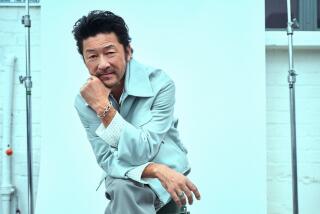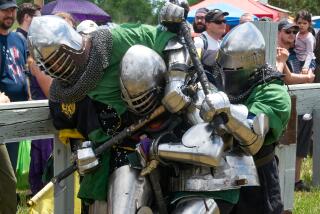‘Kombat’ Set to Battle New Terrain--and Critics
- Share via
Two years ago, the video game “Mortal Kombat” was one of the most controversial forms of children’s entertainment. It had something to do with blood and guts and on-screen maneuvers like decapitating an opponent or ripping out his spinal cord.
Now, “Mortal Kombat” is the No. 1 movie in America, having made $23 million its first weekend of release. It’s about to become a live touring show, an animated video and a CD-ROM, and an executive at New Line Cinema says the studio is already talking about a sequel. Plus there are T-shirts, toys and other merchandise, and the third installment of the home video game will reach stores in October.
For the record:
12:00 a.m. Aug. 25, 1995 For the Record
Los Angeles Times Friday August 25, 1995 Home Edition Calendar Part F Page 14 Entertainment Desk 1 inches; 20 words Type of Material: Correction
‘Mortal Kombat’-- In Thursday’s story about “Mortal Kombat,” New Line Cinema’s Chris Pula was misidentified. He is president of marketing.
“We’re seeing the start of a very successful franchise,” said David Fishof, whose David Fishof Presents company is producing “Mortal Kombat--The Live Tour.”
Both Fishof and representatives of New Line Cinema say the violence of the video game has been traded for martial arts and special effects in the movie and live tour.
“What got me excited about this was the concept that the movie and the tour don’t have to be blood and guts,” Fishof said. “It’s not violent. There is fighting, but it’s more oriented to action and martial arts.”
Chris Pula, director of marketing at New Line Cinema, which released the movie, agreed.
“We made a strategic decision to make the movie PG-13 and to distance it from the violence associated with the video game,” he said.
Pula said there are several reasons the film did so well in its opening weekend--beyond his belief that it is a quality film. One is that the studio tapped into fans of the video game by promoting the film at arcades and science-fiction and comic-book conventions. All the other promotion of the movie, though, did not emphasize that it was from the game, and New Line excluded critics from preview screenings to prevent opening-weekend focus on the violence of the video game.
But Sam Goldberg, director of marketing at New York-based Acclaim Inc., which manufactured the first two “Mortal Kombat” home video games, said the “Mortal Kombat” wave can be traced to the success of the video game.
“We are responsible for the brand-name awareness,” he said.
The Sega and Nintendo versions of the “Mortal Kombat” and “Mortal Kombat II” home video games have sold more than 10 million copies worldwide, according to Acclaim figures.
The appeal of the original “Mortal Kombat” video game--it was created by Williams Entertainment and Midway Manufacturing and hit arcades in 1992--was that it contained live-action fight scenes. That is, the images on the screen were actual filmed sequences of people doing kicks and jumps with graphics added to enhance those images. Also, players had options to choose from eight characters, all of whom had different story lines and unique traits.
“Mortal Kombat--The Live Tour” will make its debut Sept. 14 at New York’s Radio City Music Hall. Shows are scheduled through December and include stops in Anaheim and Los Angeles on Oct. 21 and 22.
Fishof said he is expecting the tour to go worldwide and to last well over a year. And he’s not worried about any backlash or controversy such as the original video game caused.
“I’m a father of six children, and I would definitely take my kids to see this,” Fishof said, pointing out that his 11-year-old son is a big fan of the games. “I was concerned originally about the video game, but it’s really nothing worse than what’s on television. And there is a message and a sense of it being good conquering evil and of never giving up, and that’s what we concentrated on for the tour.”
But opponents of “Mortal Kombat” aren’t buying the argument that the film and live tour are cleaned-up versions of the video game.
“They’re really nothing more than two-hour promotions for the most violent video game ever,” said Jerry Rubin, director of the Los Angeles Alliance for Survival, which monitors violence in children’s programming. “They say the violence [in the film] is OK because there is no blood. Well, that’s just ludicrous. And they say there’s a positive message of conquering your fears. The message really is conquer your enemies by kicking their butts.”
California Atty. Gen. Daniel E. Lungren, a longtime critic of “Mortal Kombat,” said he is afraid of the effects it might have on children.
“What is so troubling is the inescapable fact that ‘Mortal Kombat’ in all its forms is being marketed--sometimes in subtle ways and sometimes not so subtly--to children,” Lungren said recently. “My purpose is primarily to focus on the positive alternatives and to encourage parents . . . to take proactive action to change the cultural influences being peddled to their kids.”
Times staff writer Claudia Puig contributed to this report.
More to Read
The biggest entertainment stories
Get our big stories about Hollywood, film, television, music, arts, culture and more right in your inbox as soon as they publish.
You may occasionally receive promotional content from the Los Angeles Times.










